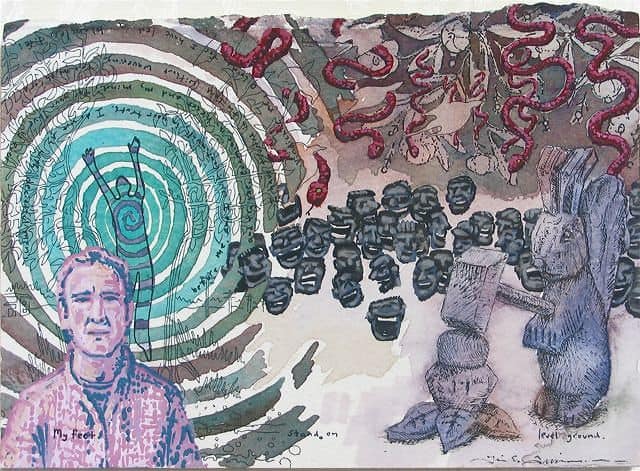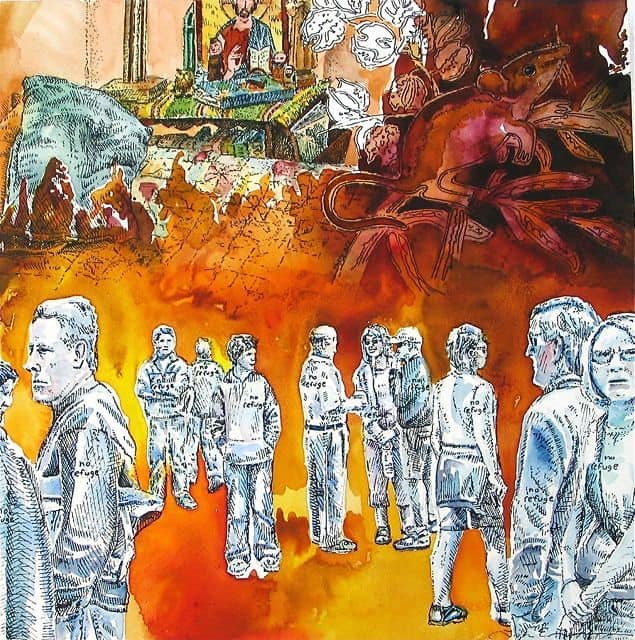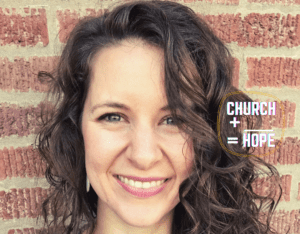5 radical ways the church can provide real community for the sexual and gender minorities in their midst

I am finding myself weary of the in-between space I feel I occupy. It can be a lonely space, and it’s one few have chosen to inhabit, maybe for good reason. I’m irritable today, which feels like a nagging cold I’m trying to shake. And I feel like I got the cold thinking about my narrative, reflecting on the thoughts of a dear Christian friend who’s taking on more of a gay activist stance in his life, and watching a promo video for an evangelical writer talking about how pastors should address the issue of homosexuality in their churches.
Some background: I’m a 51-year-old man who has been celibate my entire life, focusing my attention on loving my community, brothers, sisters, extended family and students as best as I have been able. Celibacy, or “singleness,” has never felt like a calling; it’s simply me daily trying to be faithful to the sound of God’s voice and what I believe He’s asked me to take on. Let’s just say that, wow, these days sure can add up. I have a “family” I am doggedly committed to, as I think any Christ-follower worth their salt has—it just doesn’t look like James Dobson’s version of a family. Mine is more of a rag-tag, mix-matched, motley crew of the wide-eyed broken and hopeful.
I am where I am in life because my sexual impulses are for men and being intimately involved for my entire life in a faith community where pursuing a same-sex romantic relationship was not an option. In my narrative, being “gay” would’ve cost me my community, so I never took the risk and simply have done what I have felt (and still feel) is the faithful choice. I have also had all kinds of wonderful opportunities to work through my own garbage in the process and have built a phenomenal band of brothers along the way. It is what it is.
Times are changing in the church, aren’t they? The difficulty I’m having is finding that those on both sides of “the gay issue” are more often than not shortsighted, caught in an us/them narrative, and lacking mutual empathy. Personally, I’m desperately trying to listen closely to what the Spirit is doing, simply by asking others, “How is God showing up in your life?” and sitting back and listening. What I’m finding is that God seems to be okay with showing up in a very broad diversity of stories and ways. All I can conclude for now is that this is all far more mysterious than I’d planned.
I have watched my own denomination I belong to, the Northwest Yearly Meeting of Friends, split over the issue of homosexuality in the past year or so. A friend of mine commented that he noticed I really didn’t participate in the debate. I simply said, “I have been having this discussion and argument inside my head for the past thirty years or so. It’s nice to see others finally entering the conversation.” I have found it refreshing to hear Christians engaging the topic no matter where they fall on the spectrum. I would simply remark, “Welcome to this difficult conversation. Where have you been?”
As the hands and feet of Christ, we should have been engaging this topic and radically loving men and women with this story in the ’50s, ’60s, and ’70s. In the ’80s, most Christians were anything but Jesus as we lived out of fear and let men die (of AIDS) by the side of the road because it was God’s retribution on them for their sin anyway. Fast-forward to the year 2018, where it is the topic at hand in Christian circles. But we have been so absent, so busy with what we want and making a pretty little Christian home for ourselves that we are now entering a foreign landscape full of people we neglected, avoided, or outright abandoned for a long time. We will have to earn a lot of trust here.
So people write about this topic. God bless all the books out there on homosexuality and faith—they’re still popping out of the presses. Maybe we’ll figure this out someday. I wrote about it, too, in A Bigger World Yet, the book I put out eight or so years ago. I honestly give more weight to what’s written by those who are living the story. It’s great that theologians and other Christians who don’t find themselves attracted sexually to their own gender want to engage the topic. They reason thoughtfully in their videos about all the research they’ve done, as they stand in front of their mantle laden with pictures of their wife and kids. But to me, this often comes across like a white person talking about the black experience, or an American person talking about what it is like to be from Tibet. They certainly have some wisdom and insight to share, but it’s awkward when a majority community talks about how insightful they are, in a spiritual or practical sense, about a minority community. Things are bound to be a little sloppy, inaccurate and, well, presumptuous. They have not had to live this life from the inside.
I understand Christ-followers who want to stick to the biblical tradition of marriage as a woman and man. It makes a lot of sense. Granted, it’s what I have stuck to for all these years. And yet, what I see is largely that those who hold this view are profoundly passive. Didn’t Christ say that really following him may cost you more than simply explaining your point of view and theology on the matter? Sure, the rhetoric is great and you can back it up with what your interpretation of Scripture, but who cares? What are you doing? The matter at hand, I believe, really isn’t so much about what those gay people should or should not be doing in the bedroom; the bigger issue is what all those well-groomed, smiling, friendly straight Christians should be doing to be salt and light. The narrative presented often is one about having our theology correct about what behavior is acceptable in lives of gay folks, when it needs to be about how Christians are radically living in order to love a community different from themselves. I don’t care if you are affirming or non-affirming in your community: Get off the couch.
So, as a celibate man on the inside, who has been part of the Christian community my whole life, let me make some radical suggestions to you one-woman-one-man folks if you really want to be an agent of change here. Here are five “crazy” suggestions as to what that radical salt and light could look like:

1. Apologize
Where to begin? Let’s just start with what happened during the AIDS crisis. Let’s talk about all the folks that have been in our churches…and left unloved. Let’s talk about our mothers, fathers, sisters, brothers, cousins and loved ones who have been ostracized or have hidden their story for years because we weren’t a safe place for them to be honest. How about all the times we have made others feel less than and terribly broken by pestering them weekly with questions like “Who are you dating? Why aren’t you married? Is there a woman in your life?”…when we in our self-absorption really didn’t have the wisdom or courage to simply ask, “What do you want right now in your relationships, and how can I support you?”
Let’s set up booths on the street in front of our churches confessing our sins of commission and omission on these matters. How about we have Wednesday evenings with banners strung in the eaves saying “I’M SORRY,” where we simply invite those who are gay to come and tell their story and then we simply ask them for their forgiveness, and confess that we have not loved them well. Moreover, let’s do the hard work of simply asking, “What do you need, and how can I walk with you from this day forward?”
2. Take friendship seriously
When was the last time you heard a sermon talking about how you should give your life up for your friend? What if friendships were held to the same level of accountability and esteem as marriages were in the church? What if, as in historic times, there were “wedded friendships” where people made lifetime covenants to one another in the church, that were honored, celebrated, and kept accountable by the body of believers? Perhaps then a romantic relationship would not be seen as one’s only shot in life to be with someone and not live a life alone. What a concept!
3. Consider celibacy a gift for all people
There are those in the gay Christian community who argue that it isn’t fair for celibacy to be required simply because their proclivities are for their own gender. Understandable. So, what if radical heterosexual Christians said, “You know what? I want to stand with you in this calling, so I, too, am going to be subversive to our overly romance-seduced Christian culture, and I am going to be single with you and live a life of celibacy.” What does that kick up for you? Paul seems to say it’s the better way. All said, I think you understand my point. If those advocating for celibacy aren’t willing to live out what they are asking others who are different from them to do, their argument comes across as a straw man at best. I’ll give you another, perhaps easier, option here: What if married couples bought houses with single folks? What if married couples made lifetime commitments to friends to do life together with them in intimate community?
4. Reach out and touch someone
What if there were hotlines at churches from about 8pm to 3am so that men, rather than looking up gay porn or getting in a chat room or worse, could call and talk to a loving and caring brother? Moreover, what if the church doors were open and there was a team of heterosexual men who were there for the evening that would be happy to hug or hold a man for an hour or so, hear his story, pray with him, let him cry, and simply be a safe space to connect in a loving but non-sexual way? We could set up the same thing for women to care for one another as well. That would be scary, wouldn’t it? What if one of those gay guys got an erection? What if it triggered stuff for those who were there to help? Well, really walking with someone as Christ did, as a human enfleshed body and not just a mouth full of ideas, will cost you something. It will be scary, because your heart is at risk of getting involved. Love don’t come easy…or cheap. What if we as the church really embodied Christ that much, in the flesh? It would be work, but it also may actually meet a need and feed a hunger.
5. Let them speak
They are already in our pews and churches. People who struggle with their sexual identity and impulses. People who find themselves attracted to their own gender. People who embrace and celebrate being gay. People who are in an opposite-sex marriage but are not sexually attracted to the opposite gender. The majority of these people have been silent for many, many years. They are not “those people”, outsiders looking in. They are our people, inside our community, many of them invisible to the majority. We need to have conversations, open up safe spaces where all can share their difficult stories and narratives about sexuality so that those who come from needing their own gender so intrinsically and intimately can simply be asked in those tender places, “What’s your story? How is God showing up in your life and even within your sexuality? What is God telling you? What do you need?” and moreover, “How can I help and walk with you in this?” For that, my friend, is where the rubber meets the road.
If these things were in play in the church today, I think two things would happen. One, I don’t think anyone on the spectrum from folks like myself to those who are gay Christian activists would feel “in-between,” simply because it would be profoundly clear that there is no in-between. Why, there wouldn’t be any sides to fall between! We would simply be one unified messy body of Christ loving on one another the best we are able. Two, if these ideas were put into play largely and widely within the landscape of those who say they follow Jesus, no one could say with any footing, “Man, those Christians really hate the gays.” Instead the comments would be more like, “Wow. Those Christians are crazy.”
Let’s just say, I’m going with crazy.
Tim Timmerman is a visual artist and professor of art at George Fox University in Newberg, Oregon. He participated in ESA’s first Oriented to Love dialogue in 2011. This essay first appeared on his blog, A Bigger World Yet, and appears here by kind permission.


